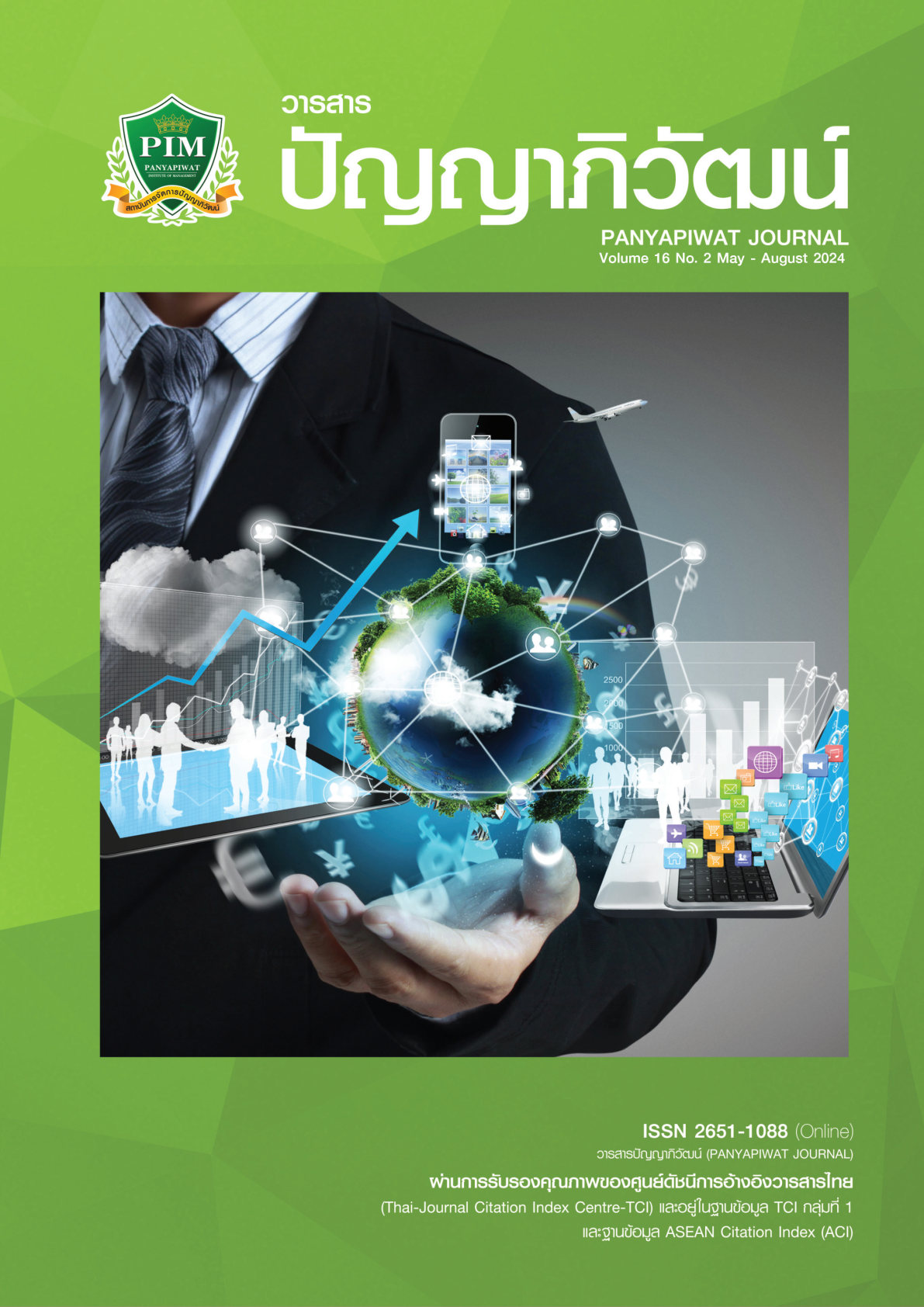การพัฒนารูปแบบการจัดการพื้นที่การเรียนรู้การสื่อสารการตลาดออนไลน์เพื่อยกระดับเกษตรกรอัจฉริยะ
Main Article Content
บทคัดย่อ
การวิจัยนี้มีวัตถุประสงค์เพื่อ 1) ศึกษาข้อมูลพื้นฐานของเกษตรกรในการพัฒนารูปแบบการจัดการพื้นที่การเรียนรู้การสื่อสารการตลาดออนไลน์เพื่อยกระดับเกษตรกรอัจฉริยะ และ 2) พัฒนาและประเมินผลการใช้รูปแบบการจัดการพื้นที่การเรียนรู้การสื่อสารการตลาดออนไลน์เพื่อยกระดับเกษตรกรอัจฉริยะ เป็นการวิจัยและพัฒนา โดยสัมภาษณ์เชิงลึกผู้ให้ข้อมูลหลัก 20 คน และสำรวจการยอมรับการสื่อสารการตลาดออนไลน์ของเกษตรกร 200 คน และทดลองใช้กับกลุ่มทดลอง 60 คน วิเคราะห์ข้อมูลด้วยค่าเฉลี่ย ส่วนเบี่ยงเบนมาตรฐาน การถดถอยแบบพหุคูณ ค่าที และวิเคราะห์เนื้อหา
ผลการวิจัยพบว่า 1) เกษตรกรที่ปลูกข้าวพันธุ์หนักขายสินค้าออนไลน์มากขึ้น แต่ประสบปัญหาบุคลากรความรู้ งบประมาณ อุปกรณ์ และสภาพแวดล้อม ส่วนหนึ่งแก้โดยให้ความรู้การใช้สื่อสังคมออนไลน์แก่เกษตรกร ส่วนการรับรู้ประโยชน์และความง่ายต่อการใช้งานสื่อการตลาดออนไลน์มีผลต่อทัศนคติการใช้สื่อการตลาดออนไลน์อย่างมีนัยสำคัญทางสถิติที่ 0.01 2) รูปแบบการจัดการพื้นที่การเรียนรู้การสื่อสารการตลาดออนไลน์เพื่อยกระดับเกษตรกรอัจฉริยะ ประกอบด้วย การจัดหลักสูตร การจัดการพื้นที่การเรียนรู้ ผู้สอนและผู้เรียนรู้รูปแบบผ่านการรับรองโดยผู้ทรงคุณวุฒิและทดลองใช้กับกลุ่มทดลอง และ 3) ผลการทดสอบหลังเรียนรู้สูงกว่า ก่อนเรียนรู้ มีค่าเฉลี่ยแตกต่างกันอย่างมีนัยสำคัญทางสถิติที่ 0.05 และกลุ่มทดลองมีความพึงพอใจต่อรูปแบบโดยภาพรวมอยู่ในระดับมาก (M = 4.37, S.D. = 0.67)
Article Details

อนุญาตภายใต้เงื่อนไข Creative Commons Attribution-NonCommercial-NoDerivatives 4.0 International License.
“ข้าพเจ้าและผู้เขียนร่วม (ถ้ามี) ขอรับรองว่า บทความที่เสนอมานี้ยังไม่เคยได้รับการตีพิมพ์และไม่ได้อยู่ระหว่างกระบวนการพิจารณาลงตีพิมพ์ในวารสารหรือแหล่งเผยแพร่อื่นใด ข้าพเจ้าและผู้เขียนร่วมยอมรับหลักเกณฑ์การพิจารณาต้นฉบับ ทั้งยินยอมให้กองบรรณาธิการมีสิทธิ์พิจารณาและตรวจแก้ต้นฉบับได้ตามที่เห็นสมควร พร้อมนี้ขอมอบลิขสิทธิ์บทความที่ได้รับการตีพิมพ์ให้แก่สถาบันการจัดการปัญญาภิวัฒน์หากมีการฟ้องร้องเรื่องการละเมิดลิขสิทธิ์เกี่ยวกับภาพ กราฟ ข้อความส่วนใดส่วนหนึ่งและ/หรือข้อคิดเห็นที่ปรากฏในบทความข้าพเจ้าและผู้เขียนร่วมยินยอมรับผิดชอบแต่เพียงฝ่ายเดียว”
เอกสารอ้างอิง
Allen, L. (2021). The Allen management system. https://www.louisallen.co.za/_files/ugd/45a39a_b40c2660c9d44b2c8c4bc7ff28054cf1.pdf
Anderson, L. W., & Krathwohl, D. R. (2001). A taxonomy for learning, teaching and assessing: A revision of bloom’s taxonomy of educational objectives. Longman.
Bermeo-Giraldo, M. C., Valencia-Arias, A., Ramos de Rosas, J. D., Benjumea-Arias, M., & Calderón, J. A. V. (2022). Factors influencing the use of digital marketing by small & medium-sized enterprises during COVID-19. Informatics, 9(86), 1-16. https://www.mdpi.com/2227-9709/9/4/86
Chantarat, S., Lamsam, A., Adultananusak, N., Ratanavararak, L., Rittinon, C., & Sangimnet, B. (2020). Distributional impacts of COVID-19 pandemic on agricultural households. Financial Lives of Thai Agricultural Households. [in Thai]
Chatpakkarattana, T., Suwatthipong, C., & Wong-A-Mart, W. (2018). Development of a smart community learning resources model in the 21st century to enhance lifelong learning characteristics of people. Sukhothai Thammathirat Open University. [in Thai]
Chitty, B., Luck, E., Barker, N., Sassemberg, A., Shimp, T. A. S., & Andrews, J. C. (2018). Integrated marketing communications (5th ed.). Cengage.
Diaz, A. C., Sasaki, N., Tsusaka, T. W., & Szabo, S. (2021). Factors affecting farmers’ willingness to adopt a mobile app in the marketing of Bamboo products. Resources Conservation & Recycling Advances, 11(2), 1-8. https://doi.org/10.1016/j.rcradv.2021.200056
Durak, G., & Çankaya, S. (2021). Handbook of research on managing and designing online courses in synchronous and asynchronous environments. IGI Global.
Francisco, J. M. (2023). The digital marketing and eCommerce conference. Springer Nature. Gracyalny, J. R., & Hurtienne. L. E. (2023). The perceived effect of learner-centered pedagogy in secondary active learning spaces and impact on student engagement. Journal of Learning Spaces, 12(1), 75-87.
Gunaratna, R., & Aslam, M. M. (2021). Civil society organizations against terrorism: Case studies from Asia. Routledge.
Lee, J. W. Y. (2017). Learning spaces around the university: Factors that affect the preferences for a space. In 3rd International Conference on Higher Education Advances (pp. 382-390). Polytechnic University of Valencia Congress. http://dx.doi.org/10.4995/HEAd17.2017.5218
Ministry of Agriculture and Cooperatives. (2020). A report summarizing important information from the Ministry of Agriculture and Cooperatives. https://www.opsmoac.go.th/annual_rpt-preview-431091791792 [in Thai]
Ministry of Agriculture and Cooperatives. (2023). Smart farmer development. https://www.opsmoac.go.th/surin-news-files-452791791174 [in Thai]
National Statistical Office. (2021). Report of the labor force survey whole kingdom. https://www.nso.go.th/sites/2014/DocLib13/ด้านสังคม/สาขาแรงงาน/ภาวะการทำงานของประชากร/2564/Full_report_q2_64.pdf [in Thai]
Nindum, S., Nindum, K., Sangchan, K., Kritawanich, A., & Promsit, S. (2020). Potential development of integrated marketing communication through digital media of Nanglae Pineapples farmers. Journal of Management Science Chiangrai Rajabhat University, 15(1), 217-238. [in Thai]
Office of the Education Council. (2017). The national education plan B.E. 2560-2579. https://www.moe.go.th/ [in Thai]
Office of the National Economic and Social Development Council. (2017). National strategy 2018-2037. http://nscr.nesdc.go.th/wp-content/uploads/2019/10/National-Strategy-EngFinal-25-OCT-2019.pdf [in Thai]
Office of the National Economic and Social Development Council. (2020). Poverty and inequality report 2020. https://www.nesdc.go.th/ewt_dl_link.php?nid=972 [in Thai]
Prachyapruit, A. (2017). Designing learning spaces for higher education institutions in the 21st century. Dusit Thani College Journal, 11(2), 379-392. [in Thai]
Prabphairee, M., & Nuamnim, T. (2019). Organizing learning spaces in the 21st century in the Office of Academic Resources and Information Technology Phetchaburi Rajabhat University. In The 9th PULINET National Conference (pp. 1-20). Burapha University. http://pulinet2019.buu.ac.th/Documentation/Proceeding/Poster/CRM/20.pdf [in Thai]
Prasertkhorawong, K. (2020). The Development of smart farmer training course for agricultural extension [Doctoral dissertation]. Maejo University. [in Thai]
Prasitrathasin, S. (2012). Social science research methods. Samlada. [in Thai]
Pollák, F., & Markovič, P. (2021). Size of business unit as a factor influencing adoption of digital marketing: Empirical analysis of SMEs operating in the central European market. Administrative Sciences, 11(3), 1-16. https://doi.org/10.3390/admsci11030071
Rachmawati, I. K., Bukhori, M., Nuryanti, F., Marta, D., & Hidayatullah, S. (2020). The effect of perceived usefulness and perceived ease of use on online buying interest is through the attitude of using social media. In 5th ICGSS International Conference of Graduate School on Sustainability (pp. 173-182). University of Merdeka Malang.
Rahman, M. M. (2019). 21st century skill “problem solving”: Defining the concept. Asian Journal of Interdisciplinary Research, 2(1), 64-74.
Rujichok, K. (2022). Knowledge management system development plan to send rice planning policy from Thai government to farmers for increasing quality products and farmers development sustainability. Journal of MCU Buddhapanya Review, 7(3), 231-242. [in Thai]
Shankar, V., Grewal, D., Sunder, S., Fossen, B., Peters, K., & Agarwal, A. (2022). Digital marketing communication in global marketplaces: A review of extant research, future directions, and potential approaches. International Journal of Research in Marketing, 39(2), 541-565. https://doi.org/10.1016/j.ijresmar.2021.09.005
Shanko, M., & Zewdie, S. (2023). Factors affecting e-marketing in developing countries: A systematic review. Journal of Business and Management, 11, 2343-2352.
Suwanmaneepong, S. (2021). The developments of marketing strategies, packaging, digital media, and rice product traceability systems of community enterprises. King Mongkut’s Institute of Technology Ladkrabang. [in Thai]
Talbert, R., & Mor-Avi, A. (2019). A space for learning: An analysis of research on active learning spaces. Heliyon, 5(12), 1-19. https://doi.org/10.1016/j.heliyon.2019.e02967
Talerngsri, K., & Pongkijvorasin, S. (2017). Agricultural business model and sustainable development in highland: A case of Nan, Thailand. The Thailand Research Fund. https://ebook.lib.ku.ac.th/ebook27/ebook/20170049/ [in Thai]
Ugolkov, I., Karyy, O., Skybinskyi, O., Ugolkova, O., & Zhezhukha, V. (2020). The evaluation of content effectiveness within online and offline marketing communications of an enterprise. Innovative Marketing, 16(3), 26-36. https://doi.org/10.21511/im.16(3).2020.03
Venkatesh, V., & Bala, H. (2008). Technology acceptance model 3 and a research agenda on interventions. Decision Sciences, 39(2), 273-315. https://doi.org/10.1111/j.1540-5915.2008
Warokka, A., Sjahruddin, H., Sriyanto, S., Noerhartati, E., & Saddhono, K. (2020). Digital marketing support and business development using online marketing tools: An experimental analysis. International Journal of Psychosocial Rehabilitation, 24(1), 1181-1188.


